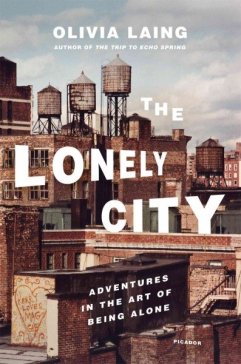I am about to move out of the house I share with three other people into a place where it’s going to be just me. I am excited at the prospect but also fearful because for the first time in my life it occurred to me that I might become lonely. In a way, it’s a strange question for me to ask because I am introverted and misanthropic, and normally go out of my way to avoid most human interactions. This fear of lonesomeness is probably due more to the fact that my friend is moving away, and due to misanthropic introversion mentioned above, I don’t have a lot of friends.
I should not lump solitude with loneliness because, as Olivia Laing points out in her new book, The Lonely City, one can be lonely even when surrounded by humans. In fact, perhaps the loneliest time in my life was not when I was surrounded by rice paddies in rural Japan, but when I lived in New York. It’s the reason I picked up Laing’s book. In it, she documents her own loneliness in NYC, and also looks at loneliness through lives of several artists, including Edward Hopper, Andy Warhol, David Wojnarowicz, and Henry Darger.
 The Lonely City received a nice review from NPR, although they thought it was beautiful but rather oppressive and well, lonely. It is, perhaps, not the most uplifting book, but it is not depressing per se. It is mostly because the lives of artists Laing chooses to profile are not exactly brimming with happiness and cheer. Wojnarowicz’s life in particular seems so brutal that it’s amazing he survived long enough to make art. Her chapters on his life and the AIDS crisis the most heartbreaking and poignant part of the book. Darger’s life is largely unknown (although Laing gets access to his diary), but his paintings are so deeply disturbing that one can’t help but imagine something awful either in his circumstances or his personality.
The Lonely City received a nice review from NPR, although they thought it was beautiful but rather oppressive and well, lonely. It is, perhaps, not the most uplifting book, but it is not depressing per se. It is mostly because the lives of artists Laing chooses to profile are not exactly brimming with happiness and cheer. Wojnarowicz’s life in particular seems so brutal that it’s amazing he survived long enough to make art. Her chapters on his life and the AIDS crisis the most heartbreaking and poignant part of the book. Darger’s life is largely unknown (although Laing gets access to his diary), but his paintings are so deeply disturbing that one can’t help but imagine something awful either in his circumstances or his personality.
As I read on, I could see what the NPR reviewer was getting at. As one goes through these lonely lies, one forgets what ties all these biographical pieces together except for a certain oppressive aesthetic. Everything is dull and gray. Humans cannot connect and instead, live in mental glass cubes with no exits.
Laing’s own struggles with loneliness are there as well, but what I didn’t expect to find in this book were her observations about her own gender, that she felt ‘more like a boy, a gay boy’, or perhaps a gender that was somewhere in the center of the spectrum. It always fascinates me how people come to realize that they are perhaps trans, since it happened to me so late in life. I did not expect this piece, but in hindsight it is relevant to the topic because of its connection to being an outsider, feeling not fitting into into neat boxes, and possibly feeling guilty as a result.
I don’t think I had a deeper insight into loneliness after finishing this book, but I discovered lives of artists about whom I did not particularly care before, and found them fascinating. I barely knew who Wojnarowicz was (there was a biography of his a couple of years ago that briefly crossed my vision, but I did not pick it up), and I did not really care about Warhol despite having a print of his art in my room, left behind by some previous tenant. I rediscovered Peter Hujar, whose ‘Orgasmic Man’ photo is on the cover of Hanya Yanagihara’s A Little Life. The Lonely City is definitely a book that made my life richer and gave me a lot of new reading paths.
 Thoughts on masculinity aside, McBee is a powerful writer. His sentences are so vivid, it’s like he is writing directly on your eyeballs, or perhaps directly on your brain. I read Man Alive in one sitting, unable to move, unable to leave the couch. I am glad it’s fairly short, because my bladder would not have been able to last for more than 170 pages.
Thoughts on masculinity aside, McBee is a powerful writer. His sentences are so vivid, it’s like he is writing directly on your eyeballs, or perhaps directly on your brain. I read Man Alive in one sitting, unable to move, unable to leave the couch. I am glad it’s fairly short, because my bladder would not have been able to last for more than 170 pages.



